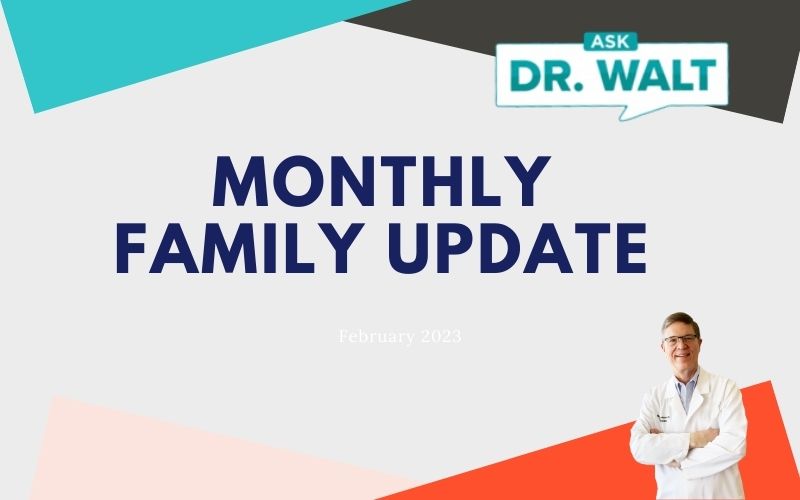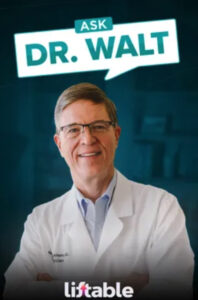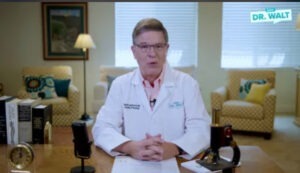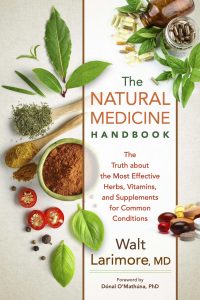
Monthly Family Update – September 2023
September 1, 2023
Chatting with Dr. Walt Larimore about His Touching Tribute to His Late Father
September 6, 2023When you worry about your health, what concerns you most? In the past, most folks worried about cancer or heart disease. Not any longer! Surveys show that six times as many people are more fearful of developing dementia than they are of cancer. I’ll tell you how to reduce those fears and dramatically your risk of dementia and Alzheimer’s on today’s episode of Ask Dr. Walt.
From 2021-2022, I was honored to host a TV show on LiftableTV, “Ask Dr. Walt.” In this two-part series, I’m be explaining how to protect and promote the health of your brain while dramatically reducing your risk of dementia and Alzheimer’s on today’s episode of Ask Dr. Walt: Brain Health—Part One
You can click below to watch a video of the show, or I’ve put the show transcript at the end of the blog if you’d prefer.
To learn more about brain health and reducing your risk of dementia or Alzheimer’s, consider picking up a copy of one of my best-selling books which has two chapters on the topic—The Natural Medicines Handbook: The Truth about the Most Effective Herbs, Vitamins, and Supplements for Common Conditions. You can find it at DrWalt.com. Just click on the tab that says books or click below.
Disclaimer: The Ask Dr. Walt show is designed for entertainment purposes to give information on various medical conditions, treatments, and procedures for your personal knowledge and to help you be a more informed consumer of medical and health services.
SHOW TRANSCRIPT
TEASE:
When you worry about your health, what concerns you most? In the past, most folks worried about cancer or heart disease. Not any longer! Surveys show that six times as many people are more fearful of developing dementia than they are of cancer. I’ll tell you how to reduce those fears and dramatically your risk of dementia and Alzheimer’s on today’s episode of Ask Dr. Walt.
OPEN:
Hi, everyone. I’m family physician Dr. Walt Larimore and I’m pleased you are taking the time to join me in my home office.
Aging begins when we’re very young and is associated with changes in brain structure and function. But starting about age forty, brain change accelerates. Brain volume and weight decrease at a rate of approximately five percent every ten years. The speed of loss increases dramatically after age seventy.
Age-related memory loss is a common and normal complaint that typically starts between the ages of forty and fifty. The old joke is that normal age-related memory loss is forgetting where you put your keys. Abnormal is not remembering what they are used for.
Dementia is the overarching term for a family of progressive brain diseases that slowly destroys memory and thinking skills. There is a spectrum from normal age-related memory loss to Alzheimer’s disease, which is the most common form of dementia. Alzheimer’s is 100 percent fatal and the only top-ten cause of death in the US with no known cure. It’s also the third leading cause of death after heart disease and cancer.
In a 2019 survey, almost half of Americans in their fifties and sixties believed they were at least “somewhat likely” to develop dementia—even though “the estimated proportion of the general population ages sixty and over with dementia at a given time is only five to eight percent.”[i]
Another U.S. survey found almost one-in-three adults, 31 percent, identified Alzheimer’s as their most feared illness when presented with a list of health issues, including cancer, stroke, heart disease, and diabetes.[ii] In another poll, six times as many older people were more fearful of developing dementia than they were of cancer.[iii] On top of that, people increasingly understand there are no medical cures for Alzheimer’s. No wonder Alzheimer’s has been called “the most feared disease in the US.”[iv]
So, I’m devoting this and our next program to the topic of brain health and what you can do to protect yourself and your family from dementia. We’ll start with the questions and comments you’ve sent in about brain health. And, at the end of this show, I’ll tell you how to send in your questions for our next program on brain health.
1) Our first question is from Catherine in Coppell, Texas: There are so many ads for supplements for brain health. What works?
That’s a great place to begin our program. Because people are so fearful about dementia and Alzheimer’s, more and more consumers are buying into the hype surrounding natural medicines, that’s herbs, vitamins, and supplements, to either prevent brain decline or improve brain health. The FDA estimates that “eighty percent of older adults rely on dietary supplements, many purporting to prevent or treat Alzheimer’s and other forms of dementia.”
The 2019 AARP® Brain Health and Dietary Supplements Survey reported that “more than a quarter of Americans age fifty and older are regularly taking at least one supplement for brain-health reasons.” Another survey reported one-third or more adults were taking supplements to help ward off memory decline. As a result, the sales of supplements claiming to boost memory have nearly increased from about $1.5 billion in 2006 to an estimated $5.8 billion by 2023. Unfortunately, almost all of these concerned and fearful people are wasting their money. The bottom line is that there is no prescription drug, over-the-counter drug, medical food, or natural medicine, such as an herb, vitamin, or supplement that has ever produced a clear benefit for helping preserve memory or for preventing Alzheimer’s disease or any other form of dementia. The experts at Natural Medicines™ write, “There is no therapy to slow the natural cognitive decline that occurs with aging.”
In 2018, AARP® became so concerned about this issue that they formed the Global Council on Brain Health. It was an independent collaborative of scientists, health professionals, scholars, and policy experts from around the world who are working in areas of brain health related to human cognition. In their exhaustive 2019 report, these international experts advised this: “We do not endorse any ingredient, product, or supplement formulation specifically for brain health unless your health care provider has identified that you have a specific nutrient deficiency.”[v]
The report analyzed every single existing study on supplements claiming to boost cognition—from fish oil to jellyfish, vitamins to minerals, and gobs of herbs. The AARP® concluded: “We do not recommend anydietary supplement for brain health.”[vi]
No, not one. There are no natural medicines that help. Nada. Naught. Nothing. Zilch. Zero. So, should you skip the rest of this show? No! Heaven forbid! Because there is help and hope available for you and your family starting with our next question.
2) Doris from Columbus, Georgia writes, “I’m still young. What can I do now to prevent dementia?”
Kirsty Marais from Alzheimer’s Research UK says this is the most common question put to them.[vii] It is well-known that both genetic and lifestyle factors play a huge role in determining your individual risk of dementia and Alzheimer’s disease. However, any genetic risk you may have could be offset by lifestyle factors.[viii] Daniel Murman, MD, the director of the Memory Disorders Program at the University of Nebraska, writes, “There is emerging evidence that healthy lifestyle choices improve brain health.” He specifically mentions the following:
- eating a healthy diet
- avoiding excessive alcohol consumption
- avoid tobacco products
- exercising regularly
- participating in cognitive-stimulating activities
- avoid social isolation
- managing emotional stress, which might include meditation
- managing medical problems, such as hypertension, diabetes, depression, and obstructive sleep apnea[ix]
Healthy lifestyle choices cut your risk of developing Alzheimer’s disease by up to 60 percent.[x] A 2019 study reported that health lifestyle choices not only stopped cognitive decline in people at risk for Alzheimer’s, but also increased their memory and thinking skills within eighteen months. One of the study authors, neurologist Richard Isaacson, MD, the founder of the Alzheimer’s Prevention Clinic at New York-Presbyterian and Weill Cornell Medical Center, said, “Our data actually shows cognitive improvement. This is the first study in a real-world clinic setting showing individualized clinical management may improve cognitive function and also reduce Alzheimer’s and cardiovascular risk.”
What were the two most important interventions? Dr. Isaacson says, “Physical activity and nutrition were by far the two most important things on the list, but those were also personalized for each individual.”
3) Denise from Monrovia, California, writes, “In a previous program you mentioned how nutrition affected risk of dementia. Is there a particular diet you recommend?”
My recommendation is based upon a number of studies. For example, in 2020, two studies reported that risk for cognitive impairment could be reduced by half by closely follow the Mediterranean style diet. Dr. Emily Chew, who directs the Division of Epidemiology and Clinical Applications at the National Eye Institute in Bethesda, Maryland, says, “People with the higher adherence to the Mediterranean diet had almost a 45 percent to 50 percent reduction in the risk of having an impaired cognitive function.” Closely following the Mediterranean style diet was defined as “eating fish twice a week, as well as regularly consuming fruits, vegetables, whole grains, nuts, legumes, and olive oil while reducing consumption of red meat and alcohol.” High fish and vegetable consumption were associated with the greatest protective effect. In reviewing the studies, Dr. Isaacson said, “The evidence continues to mount that you are what you eat when it comes to brain health.”[xi]
3) Matt from Dearborn Heights, Michigan, writes, “Have you ever heard of the MIND diet. A friend tells me it can reduce my risk of Alzheimer’s.”
I have, Matt. “MIND” stands for “Mediterranean-DASH Diet Intervention for Neurodegenerative Delay.” The MIND diet score is based on an evaluation of how much food is consumed in either (A) healthy food groups such as leafy green vegetables, other vegetables, nuts, berries, beans, whole grains, fish, poultry, olive oil, and wine, or (B) less-healthy food groups, including red meats, butter and stick margarine, cheese, pastries and sweets, fried food, and fast food. The more of the former and the less of the latter, the higher the score.
A 2020 review that had followed over twenty-five hundred older Americans for about six years reported that when the high-quality MIND diet was combined with other healthy lifestyle factors, there was a significantly decreased risk of Alzheimer dementia.[xii] The lifestyle factors were:
- a high MIND diet score,
- not smoking,
- engaging in more than 150 minutes per week of moderate- to vigorous-intensity physical activity,
- light to moderate alcohol consumption, meaning no more than one drink per day for women and two for men, and
- engagement in cognitive activities such as reading, writing, or playing chess.
The risk of Alzheimer’s dementia was 37 percent lower in those with two to three healthy lifestyle factors and 60 percent lower in those with four to five factors compared to those with no or only one healthy lifestyle factor.
4) Rosalie from Sioux Falls, South Dakota, comments, “I’ve read that good nutrition results in good brain health. I’m guessing it helps my health in other ways also, right? Like heart health?”
Bingo, Rosalie. That’s absolutely correct. But it’s even better than that. Adopting healthy lifestyle habits are a relatively inexpensive and risk-free way to increase both the quality and quantity of your years. Healthy living not only prevents or significantly delays dementia and Alzheimer’s, but also other chronic diseases such as cardiovascular disease and cancer.
Furthermore, if you participate in the five most unhealthy lifestyle habits: smoking, not exercising, being overweight, drinking too much alcohol, and eating an unhealthy diet, then you not only significantly increase your risk of poor brain health, but you also increase your risk of poor cardiovascular health, including hypertension, heart attacks, heart failure, and stroke, as well as quite a number of forms of cancer. In fact, these poor lifestyle choices explain up to three-quarters of premature cardiovascular deaths and half of the premature cancer deaths in the U.S. each year.[xiii]
4) Alexis from Springfield, Oregon, writes, “Dementia runs in my family real strong. My family doctor says there’s nothing to do. What would you advise?”
I suspect your doctor was referring to the fact that no supplements or medications can make a difference. But these lifestyle habits that I’m talking about today have been shown to dramatically reduce your risk of dementia or Alzheimer’s even if you have genes that raise your risk for these mind-destroying diseases. In fact, British researchers found, “Regardless of how much genetic risk someone had, a good diet, adequate exercise, limiting alcohol, and not smoking made dementia less likely.”[xiv] John Haaga, PhD, of the U.S. National Institute on Aging said, “I consider this good news. No one can guarantee you’ll escape this awful disease, but you can tip the odds in your favor with clean living.”[xv]
4) Bradley in Milford, Connecticut, writes, “I’m seeing a naturopath who strongly recommends something called nootropics for brain health. She also sells them, and they are pretty expensive. Are they worth the cost?”
Nootropics is just a fancy word that means brain health enhancement supplements. And they can be very expensive. I don’t think they’re worth the cost or risk. But don’t take my word for it. Let’s look at what the experts say.
For example, Harvard researchers reported, “Brain enhancement supplements have become increasingly popular. Despite their popularity, the risks of these products are poorly understood.”
Steven DeKosky, MD, the deputy director of the McKnight Brain Institute at the University of Florida, says, “We see plenty of ads on TV, but we have no evidence that any of these things (vitamins, various antioxidants, concoctions derived from animals and plants) are preventive of dementia or Alzheimer’s.” Moreover, he adds, “Some of these supplements are biologically active and can cause toxicity when you take other drugs.”
Jacob Hall, MD, a neurologist at Stanford University, writes, “There’s a lot of fear and desperation surrounding memory loss and the lack of effective medications to prevent or slow it down. Supplement companies are aware of this chasm and are increasingly rushing to fill it.”
Alzforum, a news website and information resource dedicated to researchers of Alzheimer’s disease and related disorders, reports, “Researchers believe such supplements offer false hope while shrinking the wallets of people worried about cognitive decline and dementia.”
Paul Aisen, MD, an expert in Alzheimer’s disease research and director of the Alzheimer’s Therapeutic Research Institute at the University of Southern California, says, “It is very likely that all such remedies are useless, and some are potentially hazardous.”
The Alzheimer’s Association notes that even if a supplement is safe to take on its own, it may interact with prescription medicines or other supplements in unpredictable ways.
Mayo Clinic neurologist David Knopman, MD, a researcher in dementia and Alzheimer’s, adds, “My take is that the extent of false claims made by many supplement or memory-enhancing drug manufacturers is criminal.”
It appears the FDA agrees, writing, “Simply put, health fraud scams prey on vulnerable populations, waste money, and often delay proper medical care.” In 2019, the agency mailed letters to seventeen companies formally accusing them of illegally marketing dietary supplements for dementia prevention or treatment. The supplements included vitamins, minerals, and herbal products. Some had been investigated for dementia or Alzheimer’s treatments and found in large trials to be unsafe or ineffective.
The FDA has issued more than forty warning letters in the past five years to companies illegally marketing over eighty products making Alzheimer’s or dementia disease claims on websites, social media, and in stores. Unfortunately, they’re just playing Whack-A-Mole—every time they knock one down, more pop up!
All published neuroscientist in the world contacted by Alzforum “universally believe brain health supplements are ineffective.”
Well, my time’s up for today. And I still have a pile of your questions about supplements for brain health. What about fish oil, gingko, antioxidants, multivitamins, B vitamins, vitamin D, and on and on. So, I’ll address as many of these as I can in our next program.
And I’d love to hear from you. What questions do you have about the specific supplements folks are trying to sell you for brain health? Or what general health questions do you have? Just send me your comments or questions to DrWalt@Liftable.TV. That’s DrWalt@Liftable.TV.
To learn more about brain health and reducing your risk of dementia or Alzheimer’s, consider picking up a copy of one of my best-selling books which has two chapters on the topic—The Natural Medicines Handbook: The Truth about the Most Effective Herbs, Vitamins, and Supplements for Common Conditions. You can find it at DrWalt.com. Just click on the tab that says books.
Also, at DrWalt.com you can sign up for both my daily “Medical News You Can Use” blog and my twice daily Biblical devotion, “Morning Glory, Evening Grace.”
So, until our next visit, “Dear friend, I pray that you may enjoy good health and that all may go well with you, even as your soul is getting along well.” I’m Dr. Walt Larimore and I look forward to seeing you for my next episode of “Ask Dr. Walt.”
[i] tinyurl.com/y2cao3t5
[ii] tinyurl.com/tvfy65n
[iii] tinyurl.com/rhp8x6r
[iv] tinyurl.com/sow9q9e
[v] tinyurl.com/re2tq7d
[vi] tinyurl.com/tjptbq3
[vii] tinyurl.com/szpauo7
[viii] tinyurl.com/sz8edhs
[ix] tinyurl.com/wauvwpm
[x] tinyurl.com/y2ncrxst
[xi] tinyurl.com/uqz3swl
[xii] tinyurl.com/y2ujgxen
[xiii] tinyurl.com/yyp2fld8
[xiv] tinyurl.com/tklzwca
[xv] tinyurl.com/yykk3pnt
Disclaimer: The “Ask Dr. Walt” show is designed for entertainment purposes to give information on various medical conditions, treatments, and procedures for your personal knowledge and to help you be a more informed consumer of medical and health services.
© Copyright WLL, INC. 2023. This blog provides healthcare tips and advice that you can trust about a wide variety of general health information only and is not intended to be a substitute for professional medical advice, diagnosis, or treatment from your regular physician. If you are concerned about your health, take what you learn from this blog and meet with your personal doctor to discuss your concerns.






